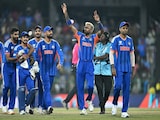The Central government's vaccine acquisition policy needs to be simplified, one of the country's top bankers, Uday Kotak of the Kotak Mahindra group, told NDTV today, pointing out that the next few months will be crucial in the battle against the virus and the country's approach needs to be recalibrated. The current fragmented policy of multiple buyers -- where the Centre buys 50 per cent and the rest is left for the states and the private sector without any guidelines -- is not sustainable, he indicated.
"Getting states to compete with each other for this undefined second quota is not a great place to be... simplify it," Mr Kotak told NDTV in an exclusive interview this evening.
"I have a recommendation to make," Mr Kotak said. Instead of three players, there should just be two -- the Centre, which should get 75 per cent of the vaccine and distribute it equitably between states and the private sector, which should get 25 per cent and fend for itself, he said.
The current vaccine policy, which has left states to acquire vaccines from manufacturers, has not worked out for them. Most states which floated global tenders, have failed to acquire any, with manufactures like Pfizer and Moderna refusing to enter into negotiations with them.
Today, Delhi Chief Minister Arvind Kejriwal said the system has failed.
"Right from the start, states were told by the Centre to manage the vaccines by themselves. Well, what has happened till now? Nothing. As far as I know, not a single state has been able to get a single dose of vaccine from abroad. Not a single one... but what is the central government doing about it? Why is it not stepping in?" he told reporters.
Mr Kotak said a recalibration of policy is crucial now as the coming months will be decisive and the country needs to prepare itself.
The capacity is going to increase on vaccine manufacturers' end – from 7 crore doses in May to 15 crore doses in August --- and only the pace of vaccination can ward off a third wave of the virus, experts have said.
Mr Kotak said this time there has to be detailed planning – for oxygen, hospital beds and drugs.
"It is not okay that we don't have medication or oxygen in critical times. The planning has to be for peaks, not averages," he said, adding that ending lockdown in the states should be a calibrated call based on that, as well as the local factors.















